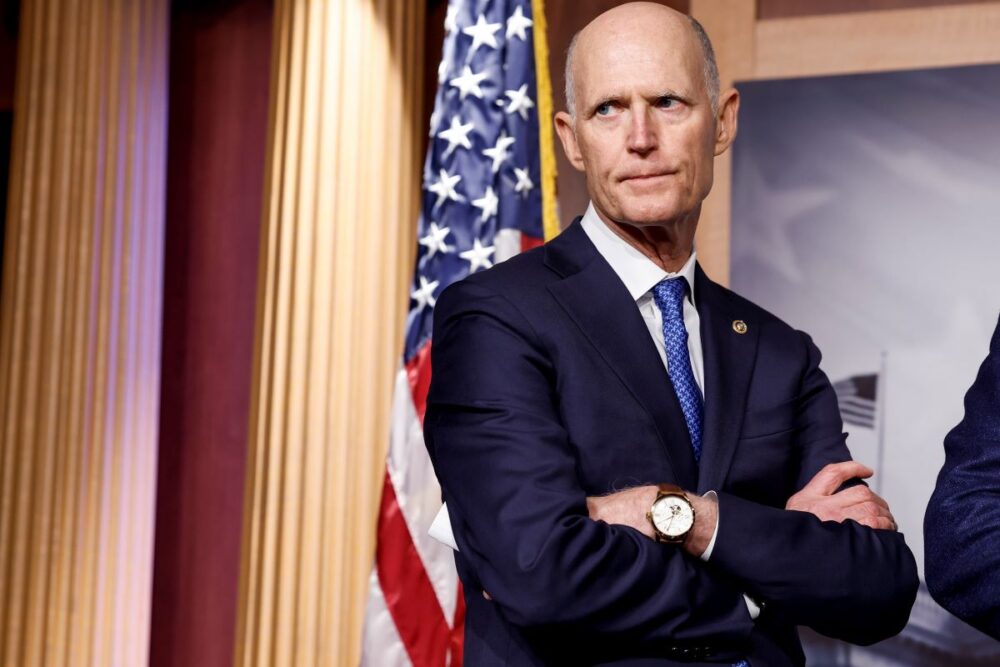
Getty Images
As the Republican senator runs for reelection, here’s a look at some of his most controversial positions.
Rick Scott, the Republican United States senator from Florida since 2019, is running for reelection in November. His likely opponent is Debbie Mucarsel-Powell, the former Congresswoman who in 2019 became the first South American-born immigrant to serve as a US Representative.
In his bid to woo Hispanic voters, Scott— a member of the Republican Party who was the 45th governor of Florida from 2011 to 2019—has unleashed a multi-million-dollar strategy across the state to the tune of 300 political TV ads in the last month alone.
In the midst of a barrage of political messages and campaign promises, here are 10 things to know about Rick Scott.
1. He blocked Medicaid Expansion as governor
Scott’s continued refusal to support Medicaid expansion while governor has left nearly 12% of Floridians without potentially life-saving health insurance, according to the latest US Census Bureau estimates. The cost for expanding Medicaid would have been entirely covered by the federal government for the first three years under the Affordable Care Act (ACA), with 90% of costs covered after that. Florida is one of 10 states that has not expanded Medicaid eligibility, even though it would help about 1 million residents get health insurance.
2. He proposed a plan that could have ended Social Security and Medicare
In 2022, Scott proposed a plan to sunset all federal programs in five years, including Social Security and Medicare, meaning the programs would have required re-authorization, creating an opportunity for them to be cut or ended forever. After strong criticism from Democrats, as well as members of his own party, Scott later added an exemption for Medicare and Social Security. to his plan.
3. Scott pushed a plan to raise taxes on working families
Scott’s same 2022 plan that targeted Social Security and Medicare would also have raised taxes on nearly half of all Americans, forcing seniors and working-class families to pay more.
4. He opposes abortion rights
A longtime foe of reproductive rights, Scott last year voiced his support for Florida’s six-week abortion ban that went into effect on May 1st. Following backlash from women and pro-choice advocates across the country to red-state abortion bans, Scott softened his messaging, saying he thought Florida’s prior 15-week ban was more approrpiate.
RELATED: Inside Rick Scott’s ‘toxic record on abortion’
5. He favored property insurance companies as governor
Scott has been quick to blame Gov. Ron DeSantis for Florida’s prohibitive property insurance costs, which is more than four times the national average of $2,377. But the crisis that is forcing many Floridians to flee the state is not new. For well over a decade, the insurance market has been on a rollercoaster ride, with homeowners paying more for less coverage. In 2011, Scott’s first year in office, he signed SB 408, legislation which insurance companies and business groups praised. That’s because it allowed a reduction in overall coverage limits and made carriers file requests with the regulation office for rate increases of up to 15% to account for higher reinsurance costs, among other things.
6. Scott has been accused of violations and fraud
In 2015, as governor, Scott agreed to spend $700,000 in taxpayer money to settle seven public records lawsuits. The lawsuits alleged that Scott and several members of his staff violated state law by creating email accounts to hide their communications from state public records laws, and then withheld the documents. It marked the first time in state history that a sitting governor and attorney general had been successfully sued for violations of Florida’s public records laws.
Scott was also involved in what the Florida Democratic party has called “the largest Medicare fraud in US history.” This stems from his time as CEO of Columbia/HCA from 1987 to 1997. The company was fined after federal prosecutors discovered it was committing Medicare and Medicaid fraud. In 2000, Columbia/HCA agreed to more than $840 million in criminal fines and damages over unlawful billing practices, according to a press release from the Department of Justice (DOJ). The company later faced an additional $881 million fine in 2002, bringing its total settlement to $1.7 billion.
7. Scott supported Trump’s baseless claims of voter fraud
In the hours after the Jan. 6, 2021, violent insurrection at the Capitol that sought to prevent President-elect Joe Biden from taking office by disrupting Congress’s certificaiton of the 2020 election results, Scott voted to decertify Pennsylvania’s presidential electors, which could have altered the outcome of the election in Trump’s favor.
8. His actions negatively impacted the environment
As governor, Scott stacked the South Florida Water Management District board with appointees friendly to business and agricultural interests and slashed the budget of the district, which advises of discharges that cause algae blooms in the St. Lucie and Caloosahatchee rivers. This led to the proliferation of algae blooms that pollute Florida waters and drive tourists away.
9. He targeted voting rights
During his tenure as governor, Scott also reversed a policy that automatically restored voting rights to nonviolent felons who complete their sentence. Critics said it was a political move because felons are disproportionately low-income and minorities – groups that tend to vote for Democrats.
10. Scott opposed diversity and affirmative action proposals
Florida’s junior senator has put his name to a series of proposals that support the far-right’s fight against the so-called “woke” agenda. These include banning the US military from engaging in diversity training or “any woke ideological indoctrination,” and denying funds to a college or university if it uses affirmative action in admissions.
Are you ready to vote? Make sure to check your voter registration status, see who’s on your ballot, and make a voting plan here.
RELATED: Debbie Mucarsel-Powell: ‘Fundamental freedoms are at stake’
Support Our Cause
Thank you for taking the time to read our work. Before you go, we hope you'll consider supporting our values-driven journalism, which has always strived to make clear what's really at stake for Floridians and our future.
Since day one, our goal here at Floricua has always been to empower people across the state with fact-based news and information. We believe that when people are armed with knowledge about what's happening in their local, state, and federal governments—including who is working on their behalf and who is actively trying to block efforts aimed at improving the daily lives of Florida families—they will be inspired to become civically engaged.


Harris says nation must accept election results while urging supporters to keep fighting
Harris delivered her remarks at Howard University, her alma mater and one of the country's most prominent historically Black schools, in the same...

What happens next? A timeline of the process between voting and inauguration
Here's what happens next, from the moment the last vote was cast to Inauguration Day on Jan. 20, 2025—no conspiracy theories, no unfounded claims,...

Decline of Florida’s citrus industry hastened by Trump’s tariff tiff
Hurricanes and disease have already taken a tremendous toll on those fragrant trees, not to mention development demand for the land. This weekend I...

You may qualify to file your taxes for free in Florida—here’s how
An estimated 3.2 million Floridians will be eligible to use the IRS Direct File program to file their taxes this year. Floridians have some good...




